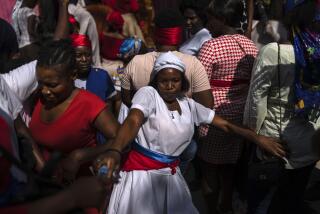Ivory Coast Looks to Life After Death of Revered Houphouet : Africa: The economic powerhouse Felix Houphouet-Boigny built on cocoa and coffee sales plunged years ago. A 50% devaluation of the currency has Ivorians suddenly struggling.
- Share via
YAMOUSSOUKRO, Ivory Coast — The eight-lane highways are bare. The 20 hotels are vacant. The three universities resemble high schools on summer break. The bars and restaurants are empty, save for the portraits of a short man watching over the deserted tables: Felix Houphouet-Boigny.
President to generations, deity to many, Houphouet-Boigny died a year ago, but his spirit lives in this bush capital that he built to honor himself. Like the cracks in the pillars of Yamoussoukro’s stupendous basilica, however, cracks are forming in Houphouet-Boigny’s vision for Ivory Coast.
The economic powerhouse he built on cocoa and coffee sales plunged years ago with world prices. A 50% devaluation of Ivory Coast’s currency this past year has Ivorians, once among the wealthiest Africans, struggling.
The political battle over replacing Houphouet-Boigny has raised fears of ethnic splits in the long-peaceful nation. Houphouet-Boigny’s dream of creating an African mecca has been marred by attacks--political and physical--on non-Ivorian Africans, who comprise one-third of the country’s 13 million people.
“Here, we say he is not a human being. We’re wondering if God will give us another gift like he was,” Kudu Kasmir said wistfully as he stood beneath a Houphouet-Boigny banner in the lobby of the Houphouet-Boigny Foundation conference center.
It is virtually impossible to find critics of Houphouet-Boigny, who ostensibly footed the bill for Yamoussoukro’s building splurge out of his personal fortune from cocoa plantations.
There is plenty of criticism of his successor, Henri Konan Bedie, and of the direction in which he is taking the long-ruling Democratic Party, known as the PDCI for its French initials.
Bedie took over a $14-billion foreign debt and painful economic reforms. The International Monetary Fund responded with loan guarantees, and in his Independence Day speech on Dec. 7 Bedie promised the country was “on the road to recovery.”
But his autocratic style has cost him support. Like Houphouet-Boigny, Bedie, a former National Assembly chairman, is a Christian from the Baoule ethnic group. Days after Houphouet-Boigny’s death on Dec. 7, 1993, he forced out the Muslim prime minister, Alassane Ouattara.
Now Bedie has pushed through a law that will let only Ivorians with two Ivorian parents run for office. That bars Ouattara and dozens of other potential candidates.
“The PDCI has declared war on us,” Djeny Kobena, secretary-general of Ouattara’s Republican Democratic Union, said at a recent rally.
The law also bans foreigners from voting, a backlash among Ivorians looking for scapegoats for their troubles. Those frustrations exploded in 1993 when Ivorian soccer fans, angry over a defeat by Ghana, killed dozens of Ghanaians.
“I don’t think Houphouet-Boigny would be happy today,” said Bahory Fulgence, a guard at the Roman Catholic basilica that rises like a stained-glass sports arena.
Everything in Yamoussoukro is exaggerated, from the monstrous, $300-million church--the largest in Christendom--to claims of the number of visitors the lonely town receives.
“We get anywhere from 500, 1,000, 3,000 every Sunday,” said Fulgence on a day when 200 people at most attended Mass, practically lost in a basilica that could hold 18,000 people.
Kasmir, who waits tables at the Hotel President, said, “There are about 100 rooms filled now.” He blissfully ignored the empty parking lot at the 285-room hotel.
The hyperbole attests to the Houphouet-Boigny style that made Ivory Coast an African fantasyland.
Throughout most of his 33-year rule--the longest reign by an African leader--Ivorians accepted one-party rule in exchange for their good fortune. When pro-democracy protests finally forced multi-party elections in 1990, he won with more than 90% of the vote.
Obsessively controlling to the end, the long-ailing leader arranged for his life-support to be cut off on Ivory Coast’s national day, the 33rd anniversary of independence from France.
His age was officially listed as 88, but he was believed to be much older.
Photographs of his body in its solid bronze coffin sell for the equivalent of $2 at the conference center.
Portraits of him hang everywhere, even on the backs of Ivorians wearing fabric featuring the country’s most famous face.
About the only thing Houphouet-Boigny failed at was turning his boyhood village, a backwater of 30,000 people, into a major capital.
The international airport is barely used. Government business is conducted in Abidjan, the commercial capital 150 miles away.
Only the moat outside the presidential palace is lively, filled with fat crocodiles who respond to the “click, click” calls of an old man paid to feed them.
More to Read
Sign up for Essential California
The most important California stories and recommendations in your inbox every morning.
You may occasionally receive promotional content from the Los Angeles Times.














